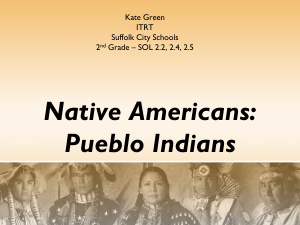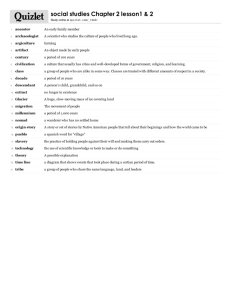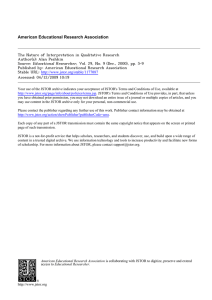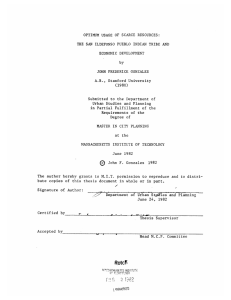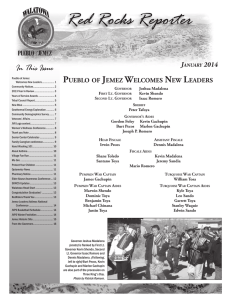Central New Mexico Community College (CNM)
advertisement
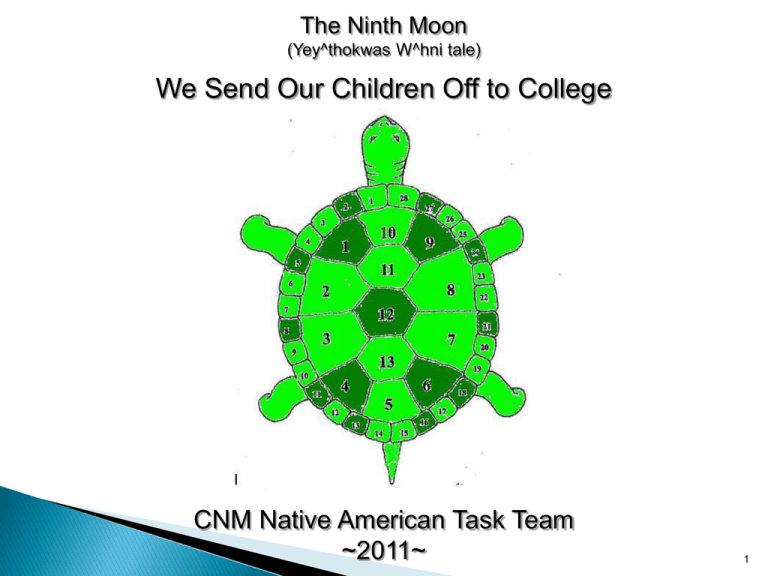
The Ninth Moon (Yey^thokwas W^hni tale) We Send Our Children Off to College CNM Native American Task Team ~2011~ 1 Yolanda Pacheco, Associate Director (Fort Mojave/Quechan/Acoma Pueblo) Dorothea (Dee) Bluehorse, Lead Tribal Liaison/Academic Advisor Technician (Navajo) Joe Skenandore, Tribal Liaison/Academic Advisor (Oneida/Luiseno) Daniel Colón, Tribal Liaison/Academic Advisor (Garifuna) Illustration Courtesy: Duane Cline, 2003 2 Native American Task Team (Past, Present, Future, Outreach) Collaborative Service Model (Goals) High School vs. College (Getting Started) Questions & Answers 3 All Students Native American Percentage Spring 2011 Fall 2010 Fall 2009 Fall 2008 Fall 2007 Fall 2006 Fall 2005 Fall 2004 Fall 2003 Fall 2002 Fall 2001 Fall 2000 Fall 1997 28,834 29,948 27,999 24,870 22,759 22,615 22,107 22,927 20,077 20,056 18,833 17,265 16,156 2,012 2,101 2,009 1,792 1,631 1,537 1,647 1,604 1,547 1,381 1,376 1,243 922 7.0 7.0 7.2 7.2 7.2 6.8 7.1 7.0 7.0 6.9 7.3 7.2 5.7 Fall 2010 Female Full Time 514 Part Time N 708 Total # of Students 1,222 Fall 2006 Male 345 532 2 877 Total 859 1,240 2 2,101 Full Time Part Time Total # of Students Female 354 606 960 Male 226 351 577 Total 580 957 1,537 4 Jicarilla Apache Shiprock Taos Pueblo ENIPC (8 Northern Pueblos) Jemez Pueblo Crownpoint Tohatchi Cuba Window Rock (AZ) Cochiti Pueblo Santo Domingo Pueblo San Felipe Pueblo Zuni Pueblo Thoreau Laguna /Acoma Pueblo Santa Ana Pueblo Isleta Pueblo To’hajillee Alamo/Navajo Mescalero Apache Hopi (AZ) White Mountain Apache (AZ) San Carlos Apache (AZ) *Outreach covered 22 of 23 Tribes in NM. 5 New Mexico Tribal Higher Education Commission -Associate Member National Indian Education Association -Planning Board Sub-Committee Member Albuquerque Indian Health Board Area -Post Secondary Member APS Indian Education Committee -Dual Credit & College Outreach American Indian Day at NM State Legislature -CNM Representation for Native American Outreach 6 7 A place where students can meet, study or relax. Retention studies show that a “home away from home” can provide a sense of community for students away from their families. Provides access to scholarship info & assistance. An intro to resources such as tutoring & career development. An intro about other helpful organizations both within & outside of CNM. 8 Welcome Day (Summer) “Show Me the Money” Workshops National Indian Heritage Day (Fall) “Transferring Made Easy” Workshops Native American Resource Open House (Spring) Native American listserv 9 American Indian Science & Engineering Society (AISES) and Native American Student Club (NASC) can help to develop the sense of community among students, as well as providing exposure to role models and mentors from the community. Student leadership opportunities can be provided directly by Native American Student Services programs, or through participation in groups which provide these activities as part of their regular services, such as AISES and Phi Theta Kappa. 10 Anthropology 2231 (North American Indians) Anthropology 2238 (Cultures of the SW) Native American Studies (CST 2253) English Speakers of Other Languages (ESOL) Native American cultural studies and literature classes taught using all Native authors help students to discover the academic and creative achievements of Native people who can serve as role models and inspire them to set high goals. 11 Set up your student computer account. This is how you will conduct all school business. Complete your new student orientation, which includes how to register for classes. Read the catalog, and see your advisor if you have questions about your classes or major. Check your financial aid-- is it ready, and will it pay for your tuition and books? Register for classes, then purchase books and supplies– check prices online to estimate costs. Get a parking sticker for your car, if you need to. 12 Go to each class, get the syllabus and read it carefully– these are the rules that the instructor requires of you. Make sure you understand the attendance policy and how your assignments will be graded. Find out where and when tutoring services are available, if you think that you may need help with any subjects. You may want to join or start a study group, because studying with others helps many students to learn outside of class. Don’t be afraid to ask the instructor for help after class or during office hours—they are there to help you learn. Find a good place to study– some students need a quiet place, while others like to be in a group. 13 We appreciate your presence and Wish you a safe trip home.

